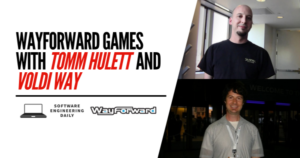Blitzscaling with Chris Yeh
Podcast: Play in new window | Download
Subscribe: RSS


Upcoming events:
A Conversation with Haseeb Qureshi at Cloudflare on April 3, 2019
FindCollabs Hackathon at App Academy on April 6, 2019
Chris Yeh is an entrepreneur, investor, and author. He co-wrote Blitzscaling with LinkedIn founder Reid Hoffman.
Blitzscaling is a strategy for growing a company that has found product market fit. Blitzscaling prioritizes speed over efficiency, arguing that fast growth is necessary to achieve “first scaler advantage.” When a company is the first to scale successfully within a large market, that company gains access to a wealth of market opportunities that are not available to companies which are not at scale.
Examples of successful Blitzscalers include Airbnb, LinkedIn, Amazon, and Facebook. In the hypergrowth phases of these companies, there were deliberate strategic tradeoffs that caused the company to suffer in the short term in exchange for the chance at market dominance in the long term.
Blitzscaling is a broad strategic concept which manifests differently in different companies.
When Airbnb was in its early stages of growth in 2011, the company was faced with the existential threat of a European competitor called Wimdu. Wimdu offered to sell to Airbnb, but this would have required the merger of two companies with distinctly different cultures. Instead, Airbnb chose to raise more money and rapidly expand into Europe.
In contrast, Google’s rapid path to becoming a dominant information service involved acquisitions that we now see as key Google products, including Android, Google Maps, and Google Earth.
Through numerous examples in recent business history, Blitzscaling explores the fundamental tradeoff between speed and efficiency, usually biasing speed as the preferable element. But Blitzscaling does not work for every company.
In the food delivery sector, many companies who tried to blitzscale ended up going out of business because they had lowered their prices too much in order to try to earn customer loyalty. By lowering their prices too much, food delivery startups built businesses with fundamentally bad unit economics and a fickle customer base.
In other cases, aggressive blitzscaling can work for a short period of time, but can cause a company’s culture to suffer in ways that are very hard to repair. Blitzscaling can also cause problems in a core software product. Growing too quickly can cause a product to have a bloated user interface. If the backend infrastructure layer expands too quickly, sensitive data could be left exposed due to a lack of proper software security policies.
Chris Yeh joins the show to talk about the strategy of Blitzscaling and his wide-ranging career. Chris studied creative writing and product design at Stanford before joining DE Shaw, the famous quantitative hedge fund. Later, he became an investor and worked in several leadership roles in software companies.
His wide range of experiences make Chris an excellent author and conversationalist. We explored the ideas of both Blitzscaling and his previous book The Alliance, which lays out a modern vision for the dynamic between employers and employees. We also talked about investing, Dungeons and Dragons, and podcasting.
Transcript
Transcript provided by We Edit Podcasts. Software Engineering Daily listeners can go to weeditpodcasts.com/sed to get 20% off the first two months of audio editing and transcription services. Thanks to We Edit Podcasts for partnering with SE Daily. Please click here to view this show’s transcript.














